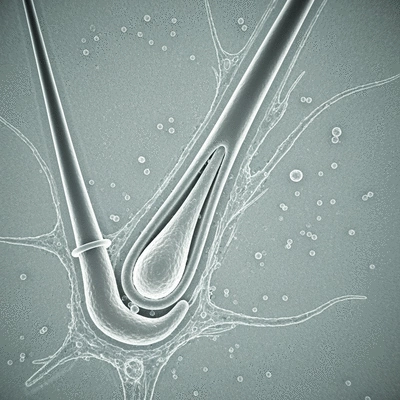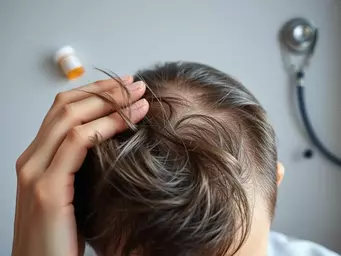Stress Management for Healthy Hair
Have you noticed an unexpected increase in hair shedding recently? You might be surprised to learn that stress could be the hidden culprit behind it. Understanding the intricate connection between stress and hair health can empower you to take proactive steps in managing both your emotional and physical well-being.
What You Will Learn
- Stress can lead to various hair loss conditions, including Telogen Effluvium, Alopecia Areata, and Trichotillomania.
- Cortisol, known as the "stress hormone," disrupts the hair growth cycle, potentially causing hair thinning.
- Telogen Effluvium is often reversible; managing stress can restore hair growth within a few months.
- Incorporating mindfulness, physical activity, and a healthy diet can effectively manage stress and promote hair health.
The Stress-Hair Loss Connection: Conditions & Treatments
Understanding how stress impacts hair health is crucial. Below, we illustrate key conditions linked to stress-induced hair loss and the integrated approaches to manage them.
The Connection Between Stress and Hair Loss: Understanding the Science
Stress can be a sneaky culprit when it comes to hair loss. As a dermatologist with over a decade of experience, I've seen firsthand how emotional and physical stress can significantly impact hair health. It's essential to understand the biological mechanisms that link stress and hair loss, as this knowledge can empower you to take control of your hair health!
When we encounter stress, our bodies react in various ways, and unfortunately, our hair can be one of the first areas to show signs of distress. Let's dive into some common conditions that illustrate this connection and explore how they affect your hair.

How Stress Influences Hair Health through Biological Mechanisms
Understanding how stress affects our bodies can help us grasp its impact on hair health. Stress triggers the release of hormones, including cortisol, which can disrupt the hair growth cycle. In fact, there are specific conditions that arise as a result of stress, which I find crucial to discuss with my patients. Here are some common stress-related conditions:
- Telogen Effluvium: A temporary condition where a significant number of hair follicles enter the resting phase, leading to increased shedding.
- Alopecia Areata: An autoimmune condition that can be triggered by psychological stress, causing patchy hair loss.
- Trichotillomania: A compulsive disorder where individuals pull out their hair, often as a response to stress.
These conditions highlight just how intertwined our emotional well-being and hair health can be. Knowing this connection can help you identify and address stressors in your life.
Exploring Telogen Effluvium: A Common Stress-Related Condition
Telogen effluvium is a frequent concern among my patients. It typically occurs after a significant stressor, like a traumatic event or major life change. What's fascinating about this condition is that it may take several months for the hair thinning to become noticeable, often leading people to wonder why their hair is falling out long after the stressor has passed. Understanding this delay can help you manage your expectations and seek appropriate support. Research published in PMC NCBI further elaborates on the relationship between psychological stress and telogen effluvium, highlighting the importance of early intervention.
The good news is that telogen effluvium is usually reversible! Once the stressor is managed, hair growth can often resume within a few months. This gives hope to those experiencing sudden hair loss, reinforcing the importance of addressing stress in our lives.
Alopecia Areata and its Association with Psychological Stress
Alopecia areata is another condition that can be linked to psychological stress. This autoimmune disorder causes sudden, patchy hair loss and can be triggered by significant emotional distress. In my practice, I emphasize the importance of recognizing stressors that may exacerbate this condition.
By addressing stress through various techniques—whether it's mindfulness, therapy, or physical activity—you can potentially reduce flare-ups. Remember, when it comes to alopecia areata, understanding the emotional triggers can be just as crucial as any treatment plan!
Trichotillomania: The Compulsive Hair-Pulling Habit
Trichotillomania, or hair-pulling disorder, is a behavior where individuals pull out their hair, often in response to stress, anxiety, or boredom. It's a complex condition that can lead to significant hair loss and emotional distress. If you or someone you know is struggling with this habit, it's essential to seek help.
In many cases, addressing underlying stressors and providing support can lead to improvement. This is why I encourage my patients to have open discussions about their emotional health as part of their hair loss journey.
The Role of Cortisol in Stress-Induced Hair Loss
Cortisol, often referred to as the "stress hormone," plays a significant role in hair loss. When stress levels rise, cortisol can disrupt the hair growth cycle, pushing hair follicles into the resting phase prematurely. Over time, elevated cortisol levels can lead to hair thinning and loss. A study in PMC NCBI provides more insights into the intricate connection between chronic stress, cortisol, and its downstream effects on hair follicles.
Being aware of the impact of cortisol on your hair can be a powerful motivator to manage stress. Imagine transforming your hair health by simply finding ways to reduce stress in your daily life! Consider exploring relaxation techniques, such as meditation or deep breathing exercises, to help lower cortisol levels.
Effective Stress Management Techniques to Combat Hair Loss
Taking control of stress is essential for maintaining healthy hair. Below, I’ll share some practical techniques that you can incorporate into your routine to manage stress effectively:
- Mindfulness and meditation: These practices can help calm your mind and lower cortisol levels.
- Physical activities: Regular exercise can boost your mood and reduce stress.
- Healthy diet: Nutrition plays a key role in overall well-being, including hair health.
By implementing these strategies, you not only support your mental health but also create a positive environment for your hair to thrive!
Pro Tip
Did you know? Incorporating relaxation techniques such as yoga or deep breathing exercises can not only help you manage stress but also support hair health. These practices lower cortisol levels, which may reduce hair loss associated with stress. Consider dedicating just a few minutes each day to mindfulness or physical activity, and watch both your stress and hair health improve!
Integrative Approaches to Managing Stress and Hair Loss
As I've explored in my practice, managing stress isn't just about calming the mind; it can also significantly influence hair health. Combining stress reduction techniques with medical treatments creates a holistic approach that can yield remarkable results. In this section, we’ll delve into various methods that can support your hair journey while tackling stress effectively!
From topical solutions like minoxidil to engaging in mindfulness practices, integrating different strategies can lead to enhanced outcomes. Let’s take a closer look at how these approaches can work hand-in-hand to promote healthier hair while reducing stress levels.

Combining Stress Reduction Techniques with Medical Treatments
When it comes to hair loss, addressing the underlying stress is crucial. Here are some effective strategies to consider:
- Topical Minoxidil: This FDA-approved treatment can stimulate hair growth, especially when combined with lifestyle adjustments.
- Prescription Medications: Certain medications may help manage stress-related hair loss by addressing hormonal imbalances.
- Therapeutic Counseling: Engaging with a mental health professional can provide the tools needed to cope with stress effectively.
By utilizing these methods alongside stress-reduction techniques, many individuals have observed improved results in both their emotional well-being and hair growth.
Overview of Treatments: Topical Minoxidil and Prescription Medications
Topical minoxidil is often a go-to for those experiencing hair thinning. It works by stimulating hair follicles, enhancing the growth cycle. Combine this with prescription medications that target stress and hormonal contributors, and you create a powerful arsenal against hair loss.
From my experience, patients who incorporate these treatments while practicing stress management often report a positive shift in their hair health journey. It’s about finding the right balance that works for you!
Patient Success Stories: Real-Life Outcomes from Integrated Approaches
One of the most gratifying aspects of my practice is witnessing the success stories of my patients. Take Sarah, for instance. After struggling with hair loss due to stress, she began a regimen that included both minoxidil and mindfulness practices.
Within a few months, not only did she notice new hair growth, but her overall stress levels decreased significantly! Stories like Sarah's highlight the impact of integrating stress management with medical treatments.
Behavioral Strategies for Managing Stress and Hair Loss
Implementing behavioral strategies can further support your journey. Consider these effective practices:
- Mindfulness Meditation: Taking just a few minutes each day for mindfulness can enhance emotional resilience.
- Physical Activity: Regular exercise not only helps reduce stress but also promotes better circulation to your scalp.
- Social Support: Engaging with friends or support groups can provide the emotional backing needed during tough times.
By incorporating these strategies, you may find a noticeable improvement in both your stress levels and hair health. The journey to healthier hair is interconnected with your overall well-being.
Frequently Asked Questions About Stress and Hair Loss
- Q: Can stress really cause hair loss?
- A: Yes, stress can indeed cause hair loss through various mechanisms, including disrupting the hair growth cycle and triggering conditions like Telogen Effluvium, Alopecia Areata, and Trichotillomania.
- Q: What is Telogen Effluvium?
- A: Telogen Effluvium is a temporary hair loss condition where significant stress pushes a large number of hair follicles into a resting phase, leading to increased shedding. It's often reversible once the stress is managed.
- Q: How does cortisol affect hair health?
- A: Cortisol, the "stress hormone," can disrupt the hair growth cycle, causing hair follicles to prematurely enter the resting phase, which leads to hair thinning and loss.
- Q: What are some effective ways to manage stress to prevent hair loss?
- A: Effective stress management techniques include mindfulness and meditation, regular physical activity, maintaining a healthy diet, and seeking professional support if needed.
- Q: Can hair loss from stress be reversed?
- A: In many cases, particularly with Telogen Effluvium, stress-induced hair loss is reversible. Managing the underlying stressor and adopting healthy lifestyle changes can help restore hair growth.
Final Thoughts on Stress Management and Hair Loss Prevention
As we wrap up this insightful journey, it's clear that building a sustainable routine for hair health is essential. The intertwining of stress management techniques with effective hair loss treatments creates a robust framework for lasting results. The Mayo Clinic also provides valuable insights into the connection between stress and hair loss, emphasizing the importance of managing stress for overall well-being.
Building a Sustainable Routine for Hair Health
Crafting a daily routine that prioritizes both mental and physical well-being is key. Here are some encouraging lifestyle modifications:
- Consistent Self-Care: Make time for yourself! Whether it’s through yoga, reading, or taking a relaxing bath, self-care is vital.
- Balanced Nutrition: Fuel your body with nutrient-rich foods that support hair health.
- Regular Check-ins: Monitor your stress levels and adjust your techniques as necessary.
These modifications can lay the foundation for long-term success in managing hair loss and stress!
Call to Action: Visiting a Dermatologist for Tailored Guidance
Remember, seeking professional help is a courageous step! If you’re struggling with hair loss and stress, consider visiting a dermatologist for tailored guidance. Together, we can devise a personalized plan that addresses your unique needs and circumstances.
Exploring the Role of Support Groups in Managing Stress and Anxiety
Lastly, don’t underestimate the power of community. Support groups can provide a safe space to share experiences and strategies for managing stress and hair loss. Connecting with others who understand your journey can be both empowering and healing!
So, let's commit to taking those vital steps towards not just better hair health, but a more balanced and fulfilling life!
Recap of Key Points
Here is a quick recap of the important points discussed in the article:
- Stress can lead to hair loss through conditions such as Telogen Effluvium, Alopecia Areata, and Trichotillomania.
- Understanding the biological mechanisms, particularly the role of cortisol, can help manage hair health.
- Effective stress management techniques include mindfulness, physical activity, and maintaining a healthy diet.
- Combining stress reduction strategies with medical treatments like minoxidil can enhance hair growth outcomes.
- Engaging in self-care and seeking professional guidance are crucial for effective hair loss management.






